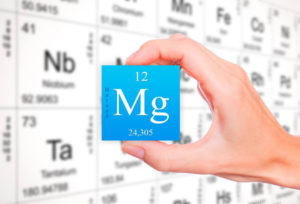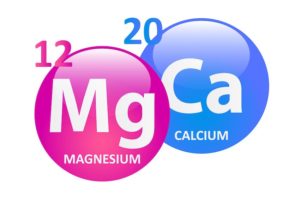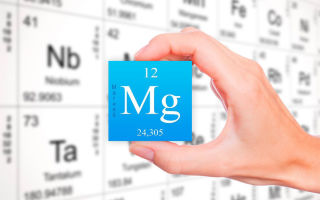Content
- 1 Why does a person need magnesium
- 2 The benefits of magnesium for the body
- 3 Daily value of magnesium
- 4 Why magnesium is good for children and pregnant women
- 5 The consequences of a lack of magnesium in the body
- 6 Magnesium containing foods
- 7 What is better for magnesium absorption?
- 8 Why is excess magnesium in the body dangerous?
- 9 Conclusion
If a person complains of fatigue, depression, cramps and deterioration in the condition of hair and nails, then he simply needs magnesium. The benefits and harms of magnesium for the human body have been studied for over 250 years, but the scientific community has not yet lost interest in this issue. We will not ignore him either.
Why does a person need magnesium
Magnesium is one of the macronutrients necessary for a healthy human life. It is the second most important mineral found in cells, and serves as a regulator of almost all processes in the body. Thus, it plays an important role in the work of more than 300 enzymes in the body, most of which convert nutrients from food into energy.

The element regulates the work of the organs of internal secretion, such as the adrenal glands, thyroid, pancreas and prostate glands. It is also responsible for the production of various hormones such as adrenaline and serotonin. The latter is also called the "hormone of joy", as it helps the body to cope with stress and is responsible for a good mood.
A sufficient amount of this mineral activates the body's defenses and improves immunity, which makes a person less vulnerable to the effects of allergens and other harmful substances.
This is not a complete list of the effect of a chemical element on the body. Its beneficial properties have a beneficial effect on all human organs, regardless of age and health.
The benefits of magnesium for the body
Magnesium brings many benefits to a woman's body. In particular, the regularity of menstruation and ovulation, as well as the normal course of pregnancy, depend on its properties. It reduces pain during premenstrual syndrome (PMS), relieves fatigue and irritability, and improves mood. This mineral soothes the symptoms of menopause and helps women get past this stage of life with minimal discomfort.
A sufficient level of the element in the body allows women to remain beautiful at any age. It gives the skin a healthy complexion, prevents the appearance of puffiness and premature wrinkles. With its help, excess fluid and harmful toxins are removed from the body, due to which metabolism improves and internal fat reserves are more actively burned. Magnesium is also useful for hair: it makes them strong, elastic and prevents hair loss. The hair will become shiny and will suffer less from the harmful effects of external factors.
The benefits of magnesium for the male body are also invaluable. With the participation of magnesium, the formation of the male sex hormone testosterone occurs, which also affects potency. It is especially important to monitor magnesium levels for older men. Senescent cells begin to produce special proteins that bind testosterone and prevent it from performing its functions effectively enough.Magnesium inhibits the activity of these proteins, activates testosterone and prolongs a man's sex life for years to come.
In addition, magnesium affects the functioning of the heart and blood vessels, as well as stabilizing the functioning of the nervous system. It is involved in the formation of bones and teeth and maintains muscle tone. It also has the ability to effectively retain urine, which is important in eliminating the harm of urinary incontinence in the elderly and young children.
For the nervous system
One of the most important functions of magnesium is the regulation of the nervous system and brain activity. This macronutrient has a positive effect on the ability to remember and process information, as it increases the sensitivity of neurons in those parts of the brain where long-term memories are stored. Thanks to this property, a person can learn new knowledge even in old age.
The unique properties of the macronutrient can reduce blood cortisol levels. This hormone is produced in high doses in stressful situations. With the help of magnesium, cortisol levels drop, it becomes easier to control emotions during stress, and concentration of attention improves.
The benefits of magnesium for anxiety and sleep disorders have been noted. The mineral controls the functioning of the hormone melatonin, which plays an important role in switching the body from sleep to wakefulness and vice versa. Thus, magnesium ensures the correct functioning of biological rhythms, calms the nervous system, eliminates irritability and insomnia. He successfully copes with migraines.
For the heart and blood vessels

Numerous studies have long proven the benefits of magnesium for the heart. A diet rich in this macronutrient prevents stroke and reduces the likelihood of other cardiovascular disorders.
The benefits of magnesium have been used successfully to treat blood pressure problems. This substance is able to alleviate the symptoms of malaise, relieving spasms of the walls of blood vessels with hypertension, keeping the vessels healthy and eliminating the likelihood of the formation of cholesterol plaques. In people in whose diet this chemical element is constantly included, the risk of harm to the development of atherosclerosis is minimized, blood clotting is better and there are practically no blood clots.
For the musculoskeletal system
Magnesium, along with calcium and phosphorus, benefits the human body, being an important building block of the skeleton. Essential for healthy bone growth and normal development of connective tissues, it controls mineral metabolism in the bone structure, is responsible for its integrity and strength, and prevents dysplasia.
Magnesium is also great for dental health. This macronutrient is part of the tooth tissue and is responsible for the strength of the tooth enamel. In addition, it is actively used in the treatment of periodontal disease, periodontitis and other gum diseases. It effectively protects teeth from harmful bacteria that cause tooth decay.
Daily value of magnesium
The body's daily magnesium requirement varies with age, biological sex and general physical condition. The table shows the dosage of the mineral for each age group.
|
Daily value of magnesium |
|
|
Children from 1 to 3 years old |
80 mg |
|
Children from 4 to 8 years old |
130 mg |
|
Boys from 14 to 18 years old |
410 mg |
|
Girls from 14 to 18 years old |
360 mg |
|
Men from 19 to 30 years old |
400 mg |
|
Women from 19 to 30 years old |
310 mg |
|
Pregnant and lactating mothers from 19 to 30 years old |
350 mg |
|
Men 31 and older |
420 mg |
|
Women 31 and older |
320 mg |
|
Pregnant and lactating mothers 31 years and older |
360 mg |
A large amount of magnesium is needed by people living in a regime of serious physical activity. The daily diet of athletes should contain at least 500 mg of this useful macronutrient.
Why magnesium is good for children and pregnant women

Magnesium is an indispensable substance during pregnancy, the benefits of which not only in maintaining the health of the expectant mother, but also in helping to form the embryo. Magnesium deficiency can have a negative impact on the development of the internal organs of the fetus, its bones and joints. The lack of the mineral also negatively affects the mother's body. It leads to loss of muscle tone, which can cause muscle tearing during childbirth. Low amounts of magnesium can even trigger a risk of miscarriage.
Children need this element no less than adults. The beneficial properties of magnesium are especially important for schoolchildren who face severe mental stress during their studies. The presence of this chemical in children's diets helps them stay alert, solve tasks faster, and respond more calmly to setbacks and stressful situations.
Despite the undoubted benefits of the element, a lot of people around the world experience a lack of it in the body. The lowest rates are observed in 10-15% of the population living in developed countries.
The consequences of a lack of magnesium in the body
Deficiency of a macronutrient in the body affects both the work of all internal systems of a person and the appearance. So, with its lack, the condition of the nails and hair worsens: they become fragile and brittle, the skin becomes painful pallor, and swelling forms under the eyes.
A lack of magnesium-containing foods on the menu can cause significant harm to the body and provoke various diseases, for example, cystitis, dysfunctions of the female reproductive system and problems with the gastrointestinal tract. Since magnesium is good for the heart, lowering magnesium levels increases the risk of heart disease. An increase in blood sugar is also possible. Therefore, it is important to be able to recognize the signs of mineral deficiency in time.
Symptoms of magnesium deficiency in the body
Insufficient presence of an element in the body is accompanied by the following symptoms:
- insomnia;
- irritability;
- fatigue;
- muscle cramps;
- dizziness;
- weakness;
- loss of appetite;
- violation of the heart rhythm;
- decreased sensitivity of the limbs.
The reasons for the deficiency can be different. It can occur due to regular nervous and physical stress, some oral contraceptives and medications. However, most often the lack of a macronutrient is caused by improper and unbalanced diet. So, in combination with many food products, magnesium is simply not perceived by the body. This includes foods rich in protein, caffeine-based drinks and vegetables containing oxalic acid. Constant consumption of unhealthy fast food also leads to a lack of magnesium.
Magnesium containing foods
To replenish the amount of magnesium, it is worth diversifying the daily menu with tasty and healthy foods containing this element. Especially there is a lot of mineral in the composition:
- green leafy vegetables;
- seaweed;
- sunflower seeds and pumpkin;
- walnuts, almonds and peanuts;
- cereals and legumes;
- apricots and dates;
- lemons and grapefruits;
- bananas.

Some types of fish contain a lot of the mineral, for example, mackerel, cod, halibut, carp, herring. It is present in milk, cottage cheese and dark chocolate.
What is better for magnesium absorption?
Certain substances can enhance the health benefits of magnesium and increase its effectiveness.Often this chemical element is combined with vitamin B6, which is no less useful for humans. With its help, magnesium more easily penetrates into cells and is faster spread throughout the body. The combination of these substances is used in the production of vitamin and mineral complexes and food supplements, which are prescribed for children and adults.
Interaction of calcium and magnesium
The balance between calcium and magnesium is important for the body. In combination with each other, these macronutrients eliminate the risk of urolithiasis, increase immunity, and maintain healthy teeth and bone tissue. Magnesium helps calcium to be absorbed better, but this only happens in the case of a harmonious balance of substances.

If a person is deficient in magnesium in the body, the increased calcium will do more harm than good. Excess calcium tends to be deposited in the body, resulting in stagnation of the mineral in soft tissues - calcification, painful cramps appear. In particularly difficult cases, heart problems can occur.
Magnesium, in contrast to calcium, does not stay in cells for a long time. However, uncontrolled intake of magnesium supplements can lead to overdose of this element.
Why is excess magnesium in the body dangerous?
As a rule, the macronutrient does not cause serious harm to the body, and to date, there have been no fatal overdose cases. However, too much of it can cause discomfort. Signs of excess include:
- bouts of diarrhea;
- nausea, vomiting;
- lack of coordination;
- deposits of salts in the kidneys;
- drowsiness;
- psoriasis.
Conclusion
Having considered all the properties of the element, we can conclude that the benefits and harms of magnesium should be on the agenda of a healthy person. Given the relative harm of the element, mainly related to overdoses, this chemical element, vital for all vital processes, must be present in sufficient quantities every day, and therefore the inclusion of magnesium-containing foods in the daily menu is recommended for all people, regardless of age.

